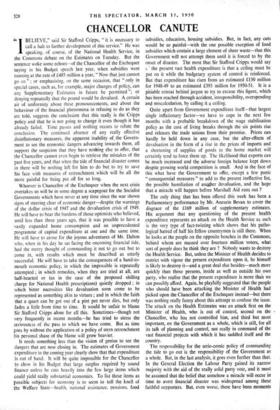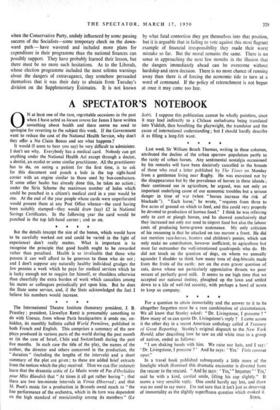CHANCELLOR CANUTE
1
44 BELIEVE," said Sir Stafford Cripps, " it is necessary to call a halt to further development of this service." He was speaking, of course, of the National Health Service, in the Commons debate on the Estimates on Tuesday. But the sentence woke some echoes—of the Chancellor of the Exchequer saying in his Budget speech last year, when subsidies were running at the rate of £485 million a year, " Now that just cannot go on " ; or emphasising, on the same occasion, that " only in special cases, such as, for example, major changes of policy, can any Supplementary Estimates in future be permitted "; or denying repeatedly that the pound would be devalued. A certain air of uniformity about these pronouncements, and about the behaviour of the financial phenomena in refusing to do as they are told, suggests the conclusion that this really is the Cripps policy and that he is not going to change it even though it has already failed. Time passes and nothing occurs to refute the conclusion. The continued absence of any really effective disinflationary measures, the apparent inability of, the Govern- ment to see the economic dangers advancing towards them, all support the suspicion that they have nothing else to offer, that the Chancellor cannot even begin to retrieve the mistakes of the past five years, and that when the tide of financial disaster comes in there will be nothing left for him to do but to try to save his face with measures of retrenchment. which will be all the more painful for being put off for so long.
Whoever is Chancellor of the Exchequer when the next crisis overtakes us will be in some degree a scapegoat for the Socialist • Governments which have never at any time since the war shown signs of steering clear of economic danger—despite the warnings of the dollar crisis of 1947 and the devaluation crisis of 1949. He will have to bear the burdens of those optimists who believed, until less than three years ago, that it was possible to have a vastly expanded home consumption and an unprecedented programme of capital expenditure at one and the same time. He will have to atone for the joyous adventures of Mr. Dalton who, when in his day he sat facing the oncoming financial tide, had the merry thought of commanding it not to go out but to come in, with results which must be described as utterly successful. He will have to take the consequences of a hand-to- mouth economic policy, in which the impossible is repeatedly attempted ; in which remedies, when they are tried at all, are half-hearted or (as in the case of the proposed shilling charge for National Health prescriptions) quietly dropped ; in which bitter necessities like devaluation soon come to be represented as something akin to virtues ; and in which the faith that a quart can be got out of a pint pot never dies, but only fades a little from time to time. It would be unfair to blame Sir Stafford Cripps alone for all this. Sometimes—though not very frequently in recent months—he has tried to stress the seriousness of the pass to which we have come. But as time goes by without the application of a policy of stern retrenchment his personal share of the blame will grow heavier.
It needs something less than the vision of genius to see the dangers that are now closing in. The estimates of Government expenditure in the coming year clearly show that that expenditure is out of hand. It will be quite impossible for the Chancellor to show in his Budget that large surplus required by sound finance unless he cuts heavily into the few large items which could yield really substantial economies. To list these items as possible subjects for economy is to seem to toll the knell of the Welfare State—health, national assistance, pensions. food subsidies, education, housing subsidies. But, in fact, any cuts would be so painful—with the one possible exception of food subsidies which contain a large element of sheer waste—that this Government will not attempt them until it is forced to by the onset of disaster. The most that Sir Stafford Cripps would say c the present vast health expenditure is that a ceiling must be put on it while the budgetary system of control is reinforced. But that expenditure has risen from an estimated £150 million for 1948-49 to an estimated £393 million for 1950-51. It is a pitiable retreat behind jargon to try to excuse this figure, which has been reached through accident, irresponsibility, overspending and miscalculation, by calling it a ceiling.
Quite apart from Government expenditure itself—that largest single inflationary factor—we have to cope in the next few months with a probable breakdown of the wage stabilisation policy as the cost of living breaks through the six points rise and releases the trade unions from their promise. Prices can hardly be held down in any case, but the after-effects of devaluation in the form of a rise in the prices of imports and a shortening of supplies of goods to the home market will certainly tend to force them up. The likelihood that exports can be much increased and the adverse foreign balance kept down despite growing world competition is small. And in the face of this what have the Government to offer, except a few panic " consequential measures " to add to the present ineffective list, the possible humiliation of anuther devaluation, and the hope that a miracle will happen before Marshall Aid rune out ?
The only thing that has been offered this week has been a Parliamentary performance by Mr. Aneurin Bevan to cover the disgrace of the £169 million of supplementary estimates. His argument that any questioning of the present health expenditure represents an attack on the Health Service as such is the very type of fact-twisting which shows that his patho- logical hatred of half his fellow countrymen is still there. When he looks at the people on the opposite benches in the Commons, behind whom are massed over fourteen million voters, what sort of people does he think they are ? Nobody wants to destroy the Health Service. But, unless the Minister of Health decides to restrict with vigour the present expenditure upon it, he himself is likely to destroy it—and a great deal else besides—much more quickly than those persons, inside as well as outside his own party, who realise that the present expenditure is more than we can possibly afford. Again, he playfully suggested that the people who should have been attacking the Minister of Health had picked upon the Chancellor of the Exchequer instead—but there was nothing really funny about this attempt to confuse the issue. The attack on the Health Estimates was an attack first on the Minister of Health, who is out of control, second on the Chancellor, who has not controlled him, and third but most important, on the Government as a whole, which is still, for all its talk of planning and control, not really in command of the vast financial projects with which it has saddled itself and the country.
The responsibility for the serio-comic policy of commanding the tide to go out is the responsibility of the Government as a whole. But, in the last analysis, it goes even further than that. In the General Election the Labour Party gained its narrow majority with the aid of the really solid party vote, and it must be assumed that the belief that somehow a miracle will occur in time to avert financial disaster was widespread among these faithful supporters. But, even worse, there have been moments when the Conservative Party, unduly influenced by some passing success of the Socialists—some temporary check on the down- ward path — have wavered and included more plans for expenditure in their programme than the national finances can possibly support. They have probably learned their lesson, but there must be no more such hesitations. As to the Liberals, whose election programme included the most solemn warnings about the dangers of extravagance, they somehow persuaded themselves that it was their duty to abstain from Tuesday's division on the Supplementary Estimates. It is not known by what fatal contortion they got themselves into that position, but it is arguable that in failing to vote against this most flagrant example of financial irresponsibility they made their worst mistake so far. But the moral remains the same. There is no sense in approaching the next few months in the illusion that the dangers immediately ahead can be overcome without hardship and stern decision. There is no more chance of running away than there is of forcing the economic tide to turn at a word of command. If the policy of retrenchment is not begun at once it may come too late.



































 Previous page
Previous page